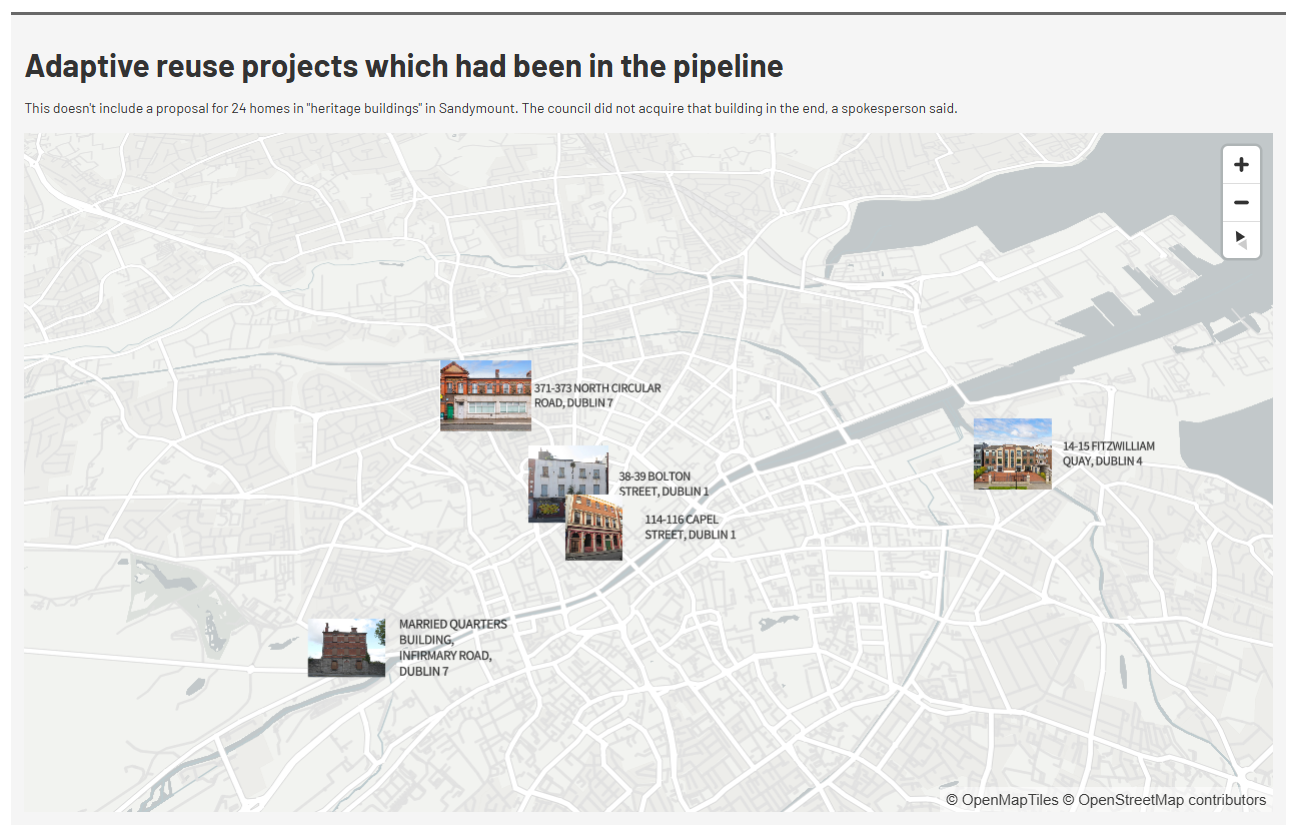Who will sit on the advisory board set to shape the future of Dublin city centre?
Seven areas of expertise should be represented, said a recent council report.
Instead, it’s moving staff to focus on other housing projects that will deliver more homes, said Dublin City Council’s head of housing.

The council is scaling back its work to turn vacant office and commercial buildings into social homes, via its “adaptive reuse” scheme, said Mick Mulhern, Dublin City Council’s head of housing, on Monday evening.
The council needs to move staff to focus on other housing projects that will deliver more homes, he said at the May monthly meeting of Dublin City Council.
Green Party Councillor Claire Byrne had queried the fate of the programme, mentioning it among a list of housing schemes that she said she felt were stalled or had been rolled back.
She pointed, as other councillors did, to much-tightened funding for the tenant-in-situ scheme, a homeless-prevention measure whereby the council can buy rental homes in cases where eligible tenants are being evicted for a sale.
But also, “another scheme that seems to have been abandoned is the adaptive reuse scheme”, she said.
“Which is shocking considering the level of vacancy and office space across the city that we have that could be so easily adapted to provide long-term quality homes for our citizens,” she said.
From a low of under 10 percent in 2020, the vacancy rate for Dublin office space has been on the rise for several years, increasing “from 15.7% to 17.5% last year”, according to Savills 2025 Market Outlook report.
Dublin City Council set up its Adaptive Reuse Unit in October 2022.
“The main objective is to deliver new homes by refurbishing vacant office and commercial space for social housing,” said Fiona Craven, a council official in the team in October 2023.
And, “to restore derelict properties and to protect newly vacant properties”, she said.
By last December, the unit had 14 projects in progress to provide an estimated 125 social homes, a council report says. That was already scaled back to six projects and 59 homes, in a report this month.
But it’ll be even fewer.
“We will be progressing one of those schemes, instead of six of them,” said Mulhern. That’s for about 15 homes at Fitzwilliam Quay, he said.

Said Byrne: “We’re just going backwards on providing housing, and not just any housing, quality housing.”
Mulhern said that the council did see it as a really worthwhile program.
“It does a great deal for the city, place making and reinvigorating the streetscapes,” he said, “and it can provide housing.”
But they’ve had to reallocate some of that staff to some of the bigger housing projects that will deliver more homes faster, he said.
The council is reviewing its staffing, though, and after that review is done, its housing department should get more staff, he said.
“At that point, when those staff land, we’ll be able to look at the big pipeline of sites that we will have available,” he said.
Mulhern said he thought it was the right move to make a judgment call based on numbers, he said.
In the meantime, the Fitzwilliam Quay project will help them understand better what adaptive schemes involve, he said.
Deirdre Heney, the Fianna Fáil councillor and head of the housing committee, said she understands the logic. “Value for money is the way I would look at it.”
There are schemes, like the “enhanced works programme” for social homes – which seeks to improve the maintenance in older flat complexes and extend the life of those buildings – that make a lot of sense to her, she says.
On Tuesday, Byrne said she still had questions about the retreat from adaptive reuse. “I hope it’s just a temporary removal of staff, but my concern is that it’s not viewed as a priority project in the city.”
She wants to see more detail of what cost-benefit analysis has been done of adaptive reuse projects, she said, to look more closely at the assertion that this reuse of buildings isn’t worth it right now.
“That’s really concerning,” she said.
Could it also mean downgrading attention given to other reuse schemes, such as the push to reactivate above-the-shop spaces? said Byrne.
Among the “big moves” recommended in the Dublin City Centre Taskforce Report, headed up by David Redmond, was that the city needed more money and accelerated schemes to tackle vacancy and dereliction.
This would seem to be moving away from that, says Byrne.
A spokesperson for Dublin City Council said that its workforce review earlier this year reflected the resources needed by the council to delivery its corporate objectives.
As part of that, it was agreed that the housing team needs more resources and skills to progress delivery at the rate needed, they said.
"As this additional resource arrives, the housing team will then be able to evaluate how best to use this resource to drive forward our ambitious housing programme for the City," said the spokesperson.
The council does own additional buildings that are capable of being progressed as adaptive reuse buildings, they said.
In the meantime, a design team will be appointed shortly for the project at Fitzwilliam Quay, the spokesperson said. "We are delighted to progress this project as it is an important vehicle for the Council to not only address vacancy but to repurpose commercial units for much needed housing."
[UPDATE: This article was updated on 14 April at 18.24 to include comments from a Dublin City Council spokesperson.]